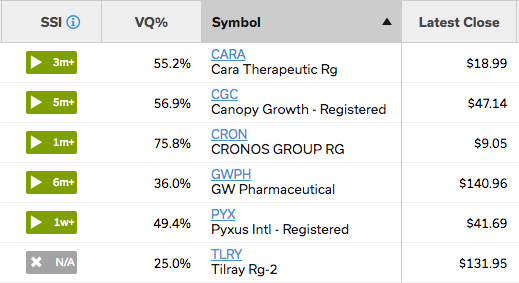“Is weed the new Bitcoin? ”
This was the question posed by Bloomberg in September, when medical marijuana stock Tilray (NASDAQ: TLRY) had one of the wildest one-day price moves anyone has ever seen.
On the wild day in question, TLRY almost doubled on billions of dollars in volume before losing all of the gains in an hour. It then finished 40% above the opening price.
It was all the emotions of a mania, a collapse and a recovery compressed in a single day’s trading.
As of this writing, Tilray has a market cap above $13 billion. A few months ago, it had a market cap above $26 billion. And a few months before that the stock didn’t even exist.
The company had its IPO in July around $23 per share. It then proceeded to run up more than 1,200% in a matter of months and then got cut in half, but still stands tall as a multibillion market cap enterprise.
There is another marijuana-related stock, Pyxus International (NYSE: PYX), that spent the past 145 years being a North Carolina-based tobacco company called Alliance One International. Alliance One changed its name to Pyxus and emphasized a new focus on cannabis; the share price doubled in three days.
No wonder pot stocks are being compared to Bitcoin and cryptocurrencies. The absolute wildness in the marijuana space is comparable to what happened with crypto in late 2017.
But is the enthusiasm justified, or is it just speculators getting out of control? Consider the view of Bill Newlands, president of Constellation Brands.
Constellation Brands, founded in 1945, is a big, serious company in a boring sector — consumer staples. It has a huge market cap at $42 billion and focuses on an established industry, beverages and spirits. If you’ve ever had a Corona or a Robert Mondavi wine, you’ve used Constellation’s products.
That matters because Constellation Brands — this big, serious consumer staples company — decided they believed enough in the future of cannabis to invest $200 million into Canopy Growth Corp. (NYSE: CGC), a budding pot stock. Then, they decided $200 million wasn’t a big enough investment and put in $4 billion more.
That’s no small bet, even for a consumer staples giant. Newlands said the global cannabis market “could be a $200 billion business in very short order.”
Coca-Cola is also looking at pot-related products. They are “closely watching” the cannabis drinks sector, reports the Financial Times.
Then too, the Canada division of Walmart — yes, Walmart! — is investigating the possibility of cannabis-related products. Nothing has been decided yet, but they are fact-finding and taking a hard look.
So yes, the action around pot stocks is, from a certain perspective, completely crazy. But it is also based on an intense jockeying for position in a new market space that could literally be worth hundreds of billions in revenues in just a few short years. And real players are sitting up and taking notice.
Why is this happening?
Because Canada has opened the floodgates. In the United States, those floodgates are still partially closed but they are slowly opening here, too.
On June 19, Canadian Prime Minister Justin Trudeau tweeted the following:
“It’s been too easy for our kids to get marijuana — and for criminals to reap the profits. Today, we change that. Our plan to legalize & regulate marijuana just passed the Senate.”
That was months ago. On Oct. 17, Canada’s big legalization rollout will go into effect.
This will make Canada only the second country in the world — and the first wealthy G7 nation — to officially legalize marijuana on the nationwide level, paving the way for a commercial market. The first country to do it was Uruguay, back in 2013.
Meanwhile, in the United States, marijuana is still illegal at the federal level. But nine U.S. states and the District of Columbia have legalized it for recreational use and another 30 U.S. states have legalized it for medical use. And there are more legalization measures coming to the ballot box.
It’s estimated that legal weed is a $9 billion business in the U.S. alone, even with its current limited status. When the U.S. finally goes all the way — and that is just a matter of time now, given dramatic shifts in voter sentiment — that number will explode.
And then the marijuana industry will inevitably go global — a phenomenon that has already begun. For example, in the United Kingdom, medical cannabis prescriptions will become legal as of Nov.1.
So, “Is weed the new Bitcoin?” In a manner of speaking, yes.
But that is because Bitcoin is a real and transformative thing, not a temporary fad like Beanie Babies or Cabbage Patch Kids.
It’s a wild time right now because cryptocurrencies like Bitcoin are at the forefront of “Internet 3.0” and the transformation of the technology landscape, while the commercially regulated cannabis industry is in the process of going from non-existent to hundreds of billions in revenue in record time (likely a short number of years).
This means a whole lot of volatility could continue to swamp the cannabis space. Pot stocks could continue to show aggressive trading patterns.
But there will also be real opportunity in this space, and in a strange way even the possibility of safe-haven investments. That’s because, in the event of a world gripped by fear and uncertainty, investors might flock to the handful of industries still showing rapid growth (especially with FANG cooling off).
Here’s a list of a handful of marijuana-related stocks you can track in TradeStops.

There is a lot to keep an eye on in this industry — plenty of peril, but plenty of serious opportunity, too. We’ll continue to dig into this exciting new industry and share what we find.





